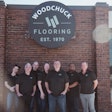
 Shutterstock.com | Jcomp
Shutterstock.com | Jcomp
Last spring, I went shopping for something to re-stain our deck. When I built the deck, my wife and I had chosen mahogany as the decking material. It's a little more expensive, but we really liked the look of mahogany and the fact that it's resistant to splitting and splintering. But the first product I stained it with, a nationally branded product, failed to penetrate the wood and wore away in a matter of months.
I went to our local big-box home center looking for both another stain and a little advice. As it turned out, I ended up with neither. After speaking to several salespeople who tried to steer me back to the stain I originally used, I finally found another who told me, "Mahogany is tough. We really don't have anything for mahogany." Well.
My story has a happy ending, however. I decided to visit a local paint and wallpaper store. When I told the owner my story, he agreed that mahogany was tough, but then showed me a product made just for exotic hardwoods like mahogany. It was more expensive, but he explained in great detail how it was made to penetrate the tight fibers of mahogany, showed me a variety of samples, and gave me detailed instructions on how to apply it for the best results. I was sold, and the bottom line is that today our deck looks fabulous. And it's a vivid example of how small local retailers can compete against the largest national retailers: specialized niche products, in-depth product knowledge and a fanatical commitment to customer service.
So, how's your customer service?
Like me, your customers don't come to you so much for a specific product as much as to solve a problem. That's an important distinction between large retailers and many small specialty retailers. Customers go to large retailers to buy things, but they go to small retailers to gather information, solve problems and only then to buy things. Here's a list of questions in the four main categories of customer service. Use these as a starting point for thinking about ways in which you can improve your customers' experience in your store.
1) The Product Knowledge
How state-of-the-art is your in-depth product knowledge? In-depth product knowledge is available in lots of places, but state-of-the-art product knowledge is rare indeed, and it takes time and effort to acquire and maintain. Do your salespeople really know your products as well as your customers need them to? Do they understand how your products solve customers' problems?
Different customers gather information differently. Some want a detailed, illustrated brochure they can read. Others need to be able to try the product themselves to see how it really works. Still others need to engage in a conversation where they can ask probing questions (that would be me!). Are your salespeople able to provide these different information gatherers the sustenance they need?
2) The Technology
Are you interactive? An ever-increasing number of customers have become accustomed to gathering information interactively. Do you have the in-store computer terminals, interactive virtual demonstrations and the audio and video technology these customers need?
Do you have a website? If not, why not? Your customers, who need detailed information to solve their problem, look with more and more frequency to the Web first. Can they find the information they need at your website? Do you provide complete product descriptions and information? Is your site easy to navigate, with no broken links? Do you link to other sites your customers might find helpful in solving their problem? Do you have a simple shopping cart and checkout functionality for customers who are ready to buy from you right there and then?
Do you have the infrastructure to support your customer service requirements? Do you have a computer system that enables you to consistently exceed your customers' expectations? Is its point-of-sale functionality customer-focused? Does it effectively handle your backroom needs? Does its purchasing and replenishment functionalities enable you to stay well-stocked? Does it fully integrate customers' special orders with the purchase orders for those customers? How well do you utilize the system? Are your inventories accurate? How about your item and price files?
3) The Customer
How good is your front end? Are your salespeople empowered to resolve customer complaints promptly and completely to your customers' satisfaction?
How well do you do special customer orders? Are you able to reliably quote price and delivery at the time the order is placed? How well do you execute the placement of these orders with your vendors? How reliable are your vendors? How diligent are you in following up with vendors to be sure they deliver on time? How well do you communicate with your customers to keep them updated on any changes in the status of their orders?
Are you able to deliver and install when it's convenient for your customers? Do you always deliver your customers' orders completely and accurately? Are installation callbacks truly a rare occurrence? Are your delivery staff and installers committed to friendly, helpful, customer service? Your customers' time is their most precious commodity; get it right the first time!
4) The Human Touch
Last but not least (I confess, this is one of my big pet peeves), does a human being answer your phone, or do you have a machine that does it for you? When a potential customer looks to you to help solve his problem, he'd rather be greeted by a friendly live voice than a friendly recorded voice. That phone call is your first opportunity to demonstrate your business is the place that can solve that customer's problem, so strut your stuff!
As a small retailer, the quality of your customer service is a critical point of differentiation and strategic advantage between you and your larger competitors. A commitment to fanatical customer service ensures not just customer satisfaction, but customer loyalty, the commitment on their part to return to your store again and again.
































